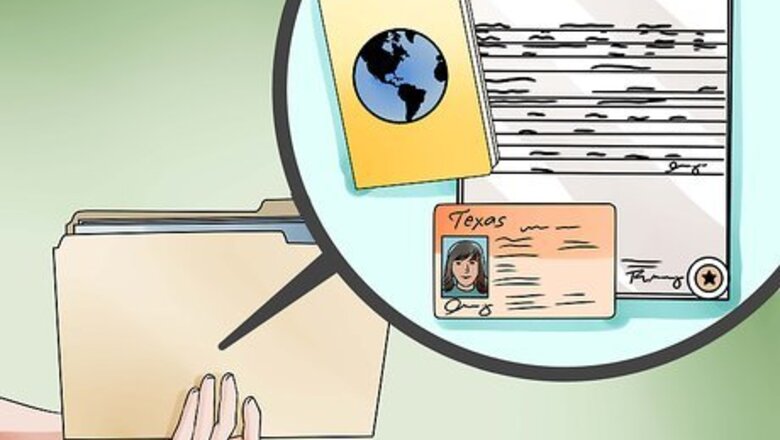
views
Preparing to Apply for a Visa
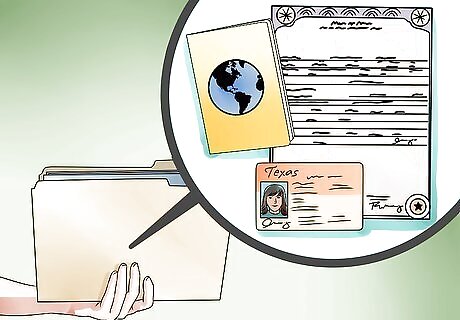
Be sure you have the necessary documentation to get a passport. The U.S. requires every applicant to provide certain information. You will need proof of citizenship. This can be an expired passport, a valid driver's license, military or other government identification, certified birth certificate, or certification of naturalization or citizenship. Make photocopies of all documentation and submit with your application. Provide a passport photo. Passport photos must be taken by someone who specializes in passport photos. Many post offices and photo studios offer this service. Complete the application form (Form DS-11), which can be found online on the U.S. Passports and International Travel website.
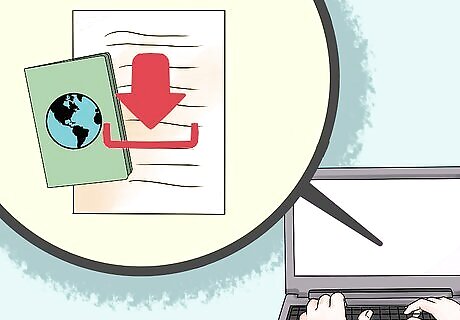
Get a valid passport from your country's immigration authority. A valid passport is required before you will be issued a visa. In the U.S., passport applications are available at post offices, local government offices and libraries. Search the Passport Acceptance Facility page to find a facility near you. You may also visit a Passport Agency in your area. Note that appointments are required. Call the National Passport Information Center 24/7 at 1-877-487-2778 to schedule an appointment. Passport applications can be found online however you need to print them and mail them to the U.S. Passports office. Currently, for an adult (over 16) a U.S. passport costs $135 for a first time passport and $110 for a renewal. It takes 4-6 weeks for a passport to be processed in the U.S. Expedited service costs an additional $60 and reduces the processing time to 3 weeks.

Know what kind of work visa you need. Visas vary based on your occupation. In the U.S., most people come on an H-1B visa which is for people with specialized training and skills. You might also come to the U.S. under a L visa if you are coming to work in a subsidiary or affiliate of your company and are a manager. If you are an agricultural worker you may need a H-2A visa. Athletes and entertainers coming to the U.S. to compete or perform will need a P-1 visa. All visa types are listed on the U.S. Visas website at www.travel.state.gov. Find out what kind of visa you need by contacting immigration officials. You can contact the U.S. embassy or find contact information online. To find the embassy closest to you, look online. U.S. embassies are listed by region at usembassy.gov.
Providing the Necessary Information
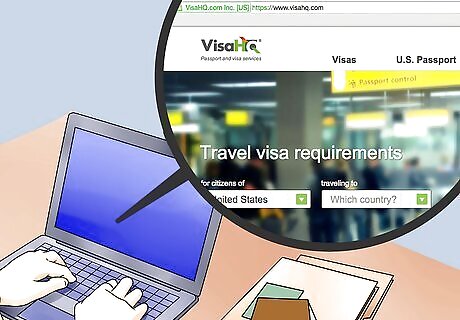
Be prepared to provide the documentation required. You can find out the visa requirements based on your country of citizenship by searching VisaHQ.com. You will need a valid passport. For a U.S. visa it must be valid for at least 60 days beyond the expiration of the visa. You may be asked to provide photos of yourself. These will be photos like that on your passport, not snapshots.
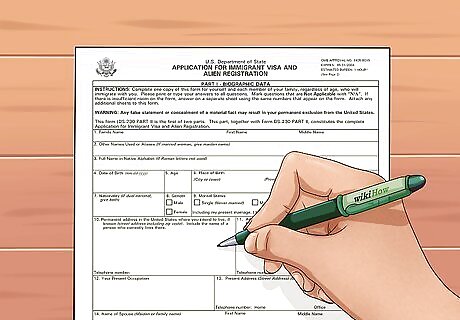
Fill out the form. All applications require information to be entered onto a form. For a U.S. visa, fill out the Immigrant Visa and Alien Registration Application (form DS-260). The application is available at U.S. embassies and online at www.state.gov under the "Travel" tab at the top of the page. You can enter the information on the PDF. A separate application must be filled out for each person who is immigrating, regardless of age.

Make sure the application is complete. Incomplete applications will be rejected. Have a friend or family member look over your application and application materials to make sure everything is complete. Be sure that whoever looks over your application reads English very well and has a great attention to detail. Have an attorney look over your application materials. If possible, use an attorney who has experience with visa applications.

Meet with an immigration official. Before your application is approved, you will need to be interviewed by an official representative from the Bureau of U.S. Citizenship and Immigration Services (USCIS). You will be contacted by the immigration official to schedule the interview. Make sure to choose a time you can be present. It is very difficult to reschedule interviews and you may risk a very lengthy delay in processing your request. Bring your passport and any other information or documents they request. Hire an interpreter if you do not understand English well. An interpreter will not be provided for you. Bring an attorney if you feel like you will be overwhelmed by the interview or if you feel like there is something that will be asked that is difficult to explain. Do not argue with or lose patience with the immigration official. Ask for an explanation of anything you do not understand. Do not lie.
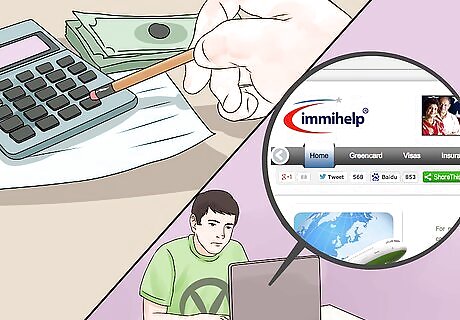
Be able to prove your income. If you already have a job this should not be a problem. The immigration authorities will want to know that you have enough income so that you will not become dependent on public assistance. Proof of income can be the offer letter from your employer. You can show your most recent tax returns (the last 2-3 years). This is particularly useful if you will be working for the same company in the U.S. If your income is not enough to meet the minimum income requirements for the U.S., other forms of support also be considered such as a spouse's income or other assets (property that can be converted into cash). To determine whether your income meets the minimum required by the U.S., check federal poverty guidelines at immihelp.com. The 2015 Poverty Guidelines state that the poverty line for a household of 2 people is $19, 912 per year. Be aware that the poverty line income level varies depending on how many people are in the household, whether you live/will live in the 48 contiguous states and whether a member of the family is in the U.S. military.
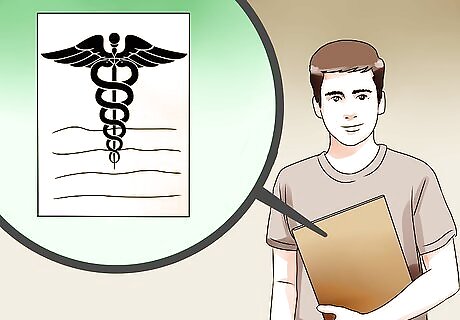
Provide medical documentation. There are vaccinations and other medical tests/treatments that are required before a visa will be granted. Common vaccinations needed are Hepatitis A, Hepatitis B, Influenza and Influenza type b (Hib), Measles, Meningococcal, Mumps, Pneumococcal, Pertussis, Polio, Rotavirus, Rubella, Tetanus and diphtheria toxoids, and Varicella. Proof of vaccination will need to be provided to the panel physician who works with the immigration authority. Obtain your immunization record from your primary care physician. If you do not have an immunization record, the panel physician will assist you in determining what vaccinations you need. You may be required to obtain a medical exam before entering the U.S. if it is possible that you have an inadmissible disease such as tuberculosis, syphilis or Hansen's Disease (leprosy).
Completing the Application
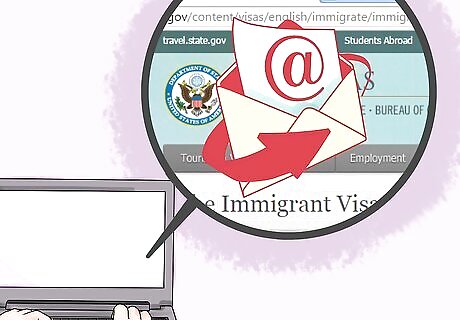
Visa applications must be submitted properly in order to be considered. Know where to submit the materials. Applications can be submitted in person at a U.S. embassy. Applications can also be submitted online at the U.S. visa website. Print the confirmation page to bring to the interview if you submit online.
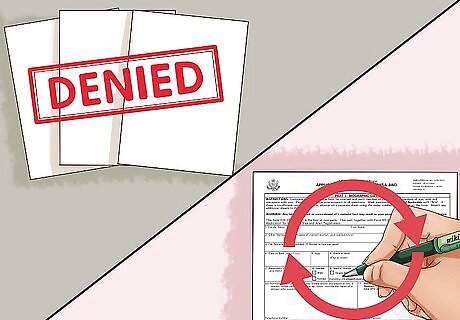
Reapply if you are denied. There are many reasons why a visa application might be denied. Your denial letter will tell you the reason. Most often an application is simply missing some necessary information which is easily obtained. If you are denied, you can reapply immediately and there is no limit on the number of times you can apply.

Pay attention to timing and fees. You need to plan ahead so you get the visa in time to immigrate. Because each visa is processed individually, it is not possible to predict how long it will take. Be sure to plan ahead so you will have the visa before you need to travel. The current fee for a temporary worker visa is $190.00.













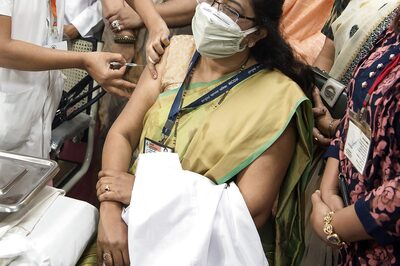






Comments
0 comment